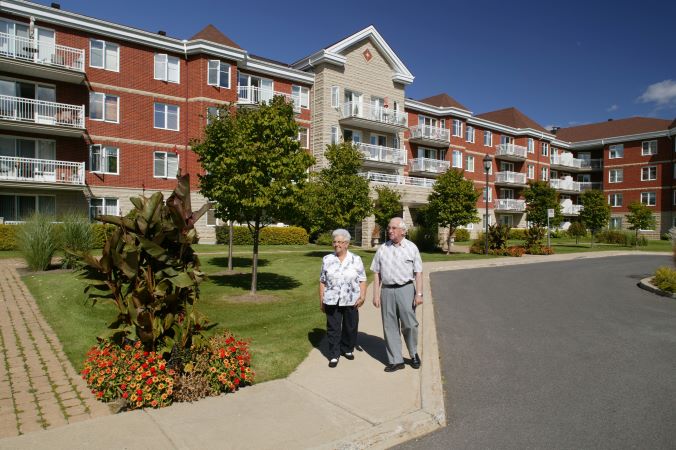Do you or does someone you know need affordable housing?
If you need affordable, safe and adequate housing, there are programs that can help, including Public Housing and Rent Supplements. For all subsidized rental programs, the rent you pay is 30% of your adjusted household income. These programs are for individuals or for families who can live independently with little or no support. For couples, one of you may have mobility or independence issues as long as the other can care for your needs.
- Public Housing: Housing NB owns a variety of rental units across the province for families and individuals. Some units have accessibility features like ramps, elevators and strobe-light smoke detectors.
- Rent Supplement Program: Housing NB has agreements with private and non-profit landlords for a number of subsidized housing units. This program funds the difference between the rent you pay and the unit's market rent value. Otherwise, it is a normal relationship between the landlord and the tenant.
- Portable Rent Supplement Program: A subsidy program for people who live with a disability. Unlike the Rent Supplement Program, which is tied to a particular building or unit, this program is for the individual to give you the freedom to find appropriate housing to meet all of your needs.
- Rural and Native Housing Program: A program for rural areas and off-reserve indigenous households.
Along with these government programs, there are a number of non-profits and housing co-operatives in New Brunswick that provide affordable housing. Non-profit housing projects are owned and operated by boards of directors made up of community volunteers. In co-operative housing projects–or co-ops–the board is made up of residents of the housing co-op.
Tenants in most non-profit and co-op housing projects have a household income below a certain level. Each organization is free to select tenants. Generally, tenants in subsidized units pay rent based on 30% of their adjusted household income. Non-profit and co-op housing tenants are frequently chosen from the provincial waitlist for affordable housing.
If your total household income is below the Housing Income Limit for your area, you may qualify for Public Housing, Rent Supplement Programs or a subsidized non-profit or co-operative housing unit.
Housing Income Limits
| HOUSEHOLD | URBAN (residing in one of NB's 8 major cities) | RURAL (residing outside city limits) |
| Single person or couple, requiring 1 bedroom | $37,000 | $50,500 |
| Single person or couple living with another person, requiring 2 bedrooms | $47,000 | $59,500 |
| Single person or couple living with more than 1 other person, requiring 3 bedrooms | $47,000 | $67,500 |
Applicants are chosen based on demonstrated need. Some exceptions to income limits may apply. Call us to discuss your situation.
Other Criteria
For the Rent Supplement Program, you must also be in at least one of the following situations:
- You live in crowded or inadequate housing.
- You pay less than 30% of your household income for rent, but adequate housing in your area would cost 30% or more of your income.
- You pay 30% or more of your household income for rent, and adequate housing in your area would cost 30% or more of your income.
For the Portable Rent Supplement Program, you must meet the criteria above and any of the following:
- Have a long-term physiological, anatomical, psychological or developmental impairment that limits your daily living. The disability must be verified in writing by a health-care professional such as a doctor, nurse practitioner, psychiatrist, psychologist, etc.
- Receive CPP Disability, any other disability pension under the New Brunswick Pension Act and/or receive the Extended Benefits Program.
- Meet the criteria for a long-term client by Mental Health (written verification required) and/or are supported by a team of mental health professionals on a long-term basis. You may be referred by community-based support groups or associations, such as the New Brunswick Association for Community Living.
Call Social Development at 1-833-733-7835. Press 1 for English, 2 for French. Press 2 to talk to someone about housing services. Tell the agent that you would like help with Public Housing or a Rent Supplement or subsidized non-profit housing unit.
The housing agent will do an initial screening over the phone. Please be ready to share contact information and Social Insurance Numbers for any household members, as well as your household income. If you would like to be considered for non-profit/co-operative housing units, tell the agent.
If you meet the basic eligibility criteria, you will go on the waitlist. We cannot provide a specific time that you can expect to wait. We give priority to people experiencing homelessness, domestic or intimate partner violence or who live with a disability.
We do an annual review of everyone on the waitlist. We will send you a letter to confirm that you would like to stay on the waitlist and still meet the criteria. If nothing has changed, simply sign and return the letter. If your information or circumstances change, it is your responsibility to contact the department to provide an update.
When a unit becomes available through the government programs, a Housing Program Officer will contact you to discuss your application. If it is eligible for support, they will tell you the next steps you need to take. If a non-profit or co-operative housing organization has a unit become available, they will contact you directly to see if it is a fit.

The housing agent will do an initial screening over the phone. Please be ready to share contact information and Social Insurance Numbers for any household members, as well as your household income.